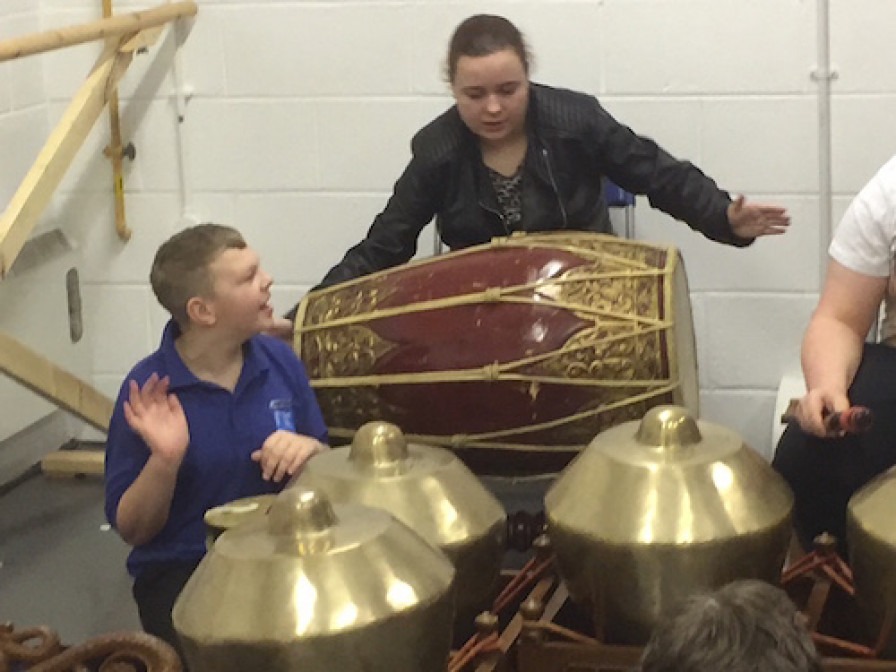‘That's what I loved about it - everyone worked together'. BlueJam Arts using gamelan to build leadership skills in a special school.

BlueJam Arts has been working with a dozen young people from James Rennie Special School over several weeks. The aim of this programme is to explore how accessible tuned percussion Gamelan instruments are to people with learning differences and how they can be used to build self-confidence, creative and leadership skills.
Our partner in the programme is The Heathlands Project, a day centre for adults with learning differences, and where our gamelan orchestra is housed.
Our Gamajam programme with the young people of James Rennie Special School has a number of aims:
· To build musical confidence and leadership skills in young people
· To introduce them to the Heathlands Centre as an out-of-school and post-school option
· To achieve an Arts Award at Explore level
Phase one of the programme took place at the Heathlands Centre. During 9 weeks of the autumn term 2016, a dozen young people aged 17 and 18 spent a morning once a week at Heathlands. They were introduced to the instruments of the gamelan orchestra and learnt how to play simple rhythms. In the tenth week we held celebration performance at James Rennie School.
Phase two of our programme took place at James Rennie School with the aim of:
- Developing leadership skills of the post 16 group, both as mentors and music leaders
- Developing practitioners professional and mentoring skills
In phase two, the same group of students who had taken part in phase one, spent a full week with nine younger KS3 players, acting as personal mentors and introducing these pupils to the gamelan orchestra. Two practitioners facilitated this week; one knowledgeable of working with special needs but less familiar with the gamelan and the other, skilled at working with groups and music but less experienced with working with special needs. Thus we had a mentoring and learning situation for our practitioners.
At the start of the week, in order to introduce ‘leadership’, each of the older students was paired with a KS3 pupil. They collected name badges for themselves and their partner and were asked to introduce their partner to an instrument, explain the numbering system, how to physically play it and dampen the sound. For some students this was less easy than for others especially as (although pairings had been carefully thought through) some of the KS3 pupils were more capable than their mentor. For day 2 some of the pairings were changed around.
As the week progressed, the older students were given more leadership and caring responsibilities.
Every post 16 student also took on a leadership role in the sessions and performance: a warm up at the start of each session, drumming or singing. For one student the gamajam programme built unexpected self-confidence. ‘Aran led the physical warm at the start of the performance by choosing a different song from his iPod for each of the 4 performance. They were full of emotion and the staff were astonished as they have never seen Aran demonstrate such confidence. At school he's terribly quiet, stays on his own and hides away at break times on a computer, and doesn't talk to anyone. He doesn't like noise - so it's extraordinary that he's been able to cope with this week; the confines of the room, the number of people and the level of noise’.
The lead practitioner had planned the week very carefully building in musical and leadership progression. However, as with all best laid plans, there was considerable re-thinking from day to day, responding to the groups strengths and weaknesses, and building on aspects that worked well.
‘We changed it today adding singing and more percussion and solos. We felt it suited the group to work slightly differently and played to their strengths, for example, we had 3 good drummers. The voices didn't quite work out as I imagined; they didn't sing as well as I knew they could, but the drummers were fantastic’. As a result, the drumming became a major element in the final performance.
The gamajam project has gained such a reputati0n in the school that most of the classes wanted to find out what the group had been doing during this week. As a result on the last day the group gave four performances, showcasing their achievements
